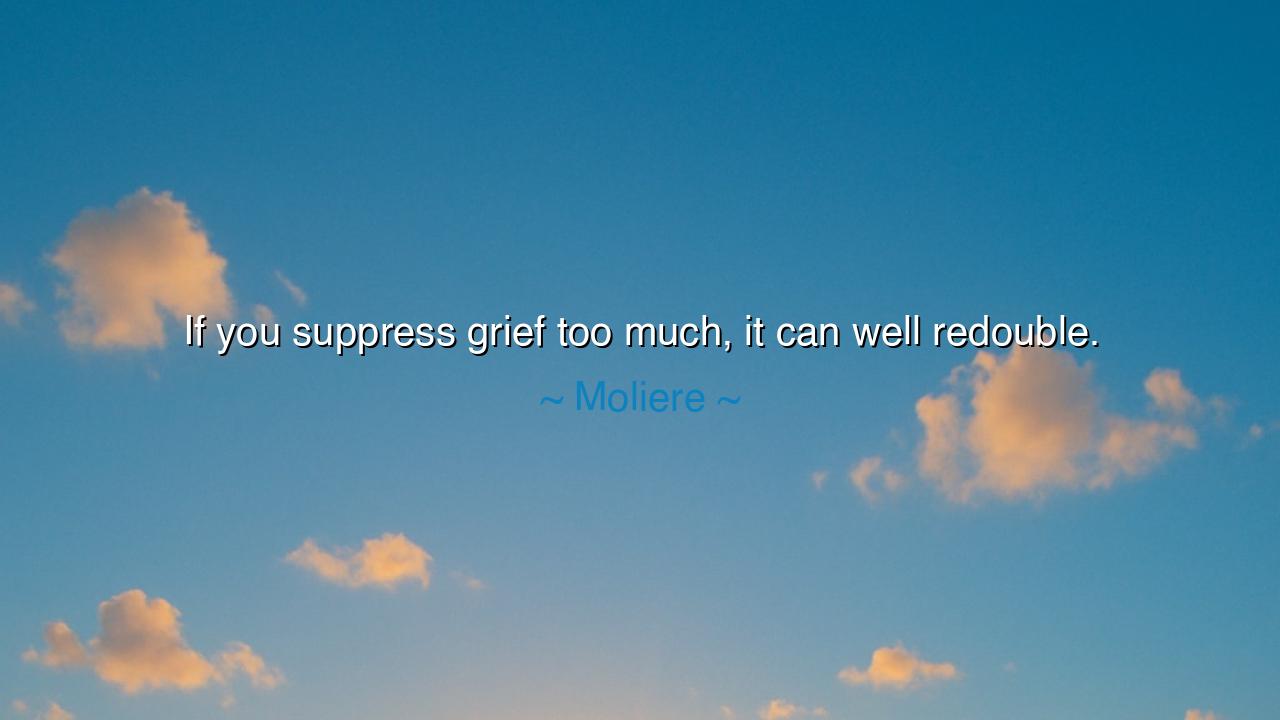
If you suppress grief too much, it can well redouble.






"If you suppress grief too much, it can well redouble." These words by Molière resonate with a profound truth that has echoed through the ages: grief is not an emotion to be buried or hidden away. It is a force of nature, and like any force, it must be acknowledged and honored. Molière speaks not only of the inevitability of sorrow but of its power when it is repressed. To attempt to bury grief too deeply is to invite it to rise again with even more intensity, for unexpressed sorrow grows like a wound left untreated. It festers in the heart, often emerging at unexpected moments with far greater force than before.
The ancients, with their wisdom rooted in understanding the human spirit, knew that grief was an inevitable part of life. Socrates, in his teachings, spoke of the necessity of embracing all human emotions, for they are what shape us and what connect us to others. Just as a river cannot be dammed without eventually breaking through, so too can the pain of grief not be contained forever. It will find its way out, and when forced into suppression, it can return more violent and uncontrollable than ever. This truth was central to the ancient Greek concept of catharsis, the purging of emotions through art and expression. Just as the soul needs to shed its anguish in order to heal, so too must we face our grief directly, lest it overwhelm us.
To understand this truth more fully, consider the example of Hercules. In his legendary Twelve Labors, he faced numerous trials that required not only strength but emotional resilience. One of his greatest battles was not with beasts or gods, but with his own grief. When Hercules was overwhelmed by the death of his loved ones, he sought to suppress his sorrow, believing it would make him stronger. Yet, his suppressed grief only led him to violent rage, turning him into a figure of destruction. His story reminds us that grief, when left unaddressed, can lead to turmoil and a loss of control. It is only through confronting our sorrow and allowing it to run its course that we can hope to find peace.
Similarly, history is filled with figures who were consumed by grief because they tried to hide it. Abraham Lincoln, during the darkest days of the American Civil War, experienced profound sorrow with the loss of his son, Willie. In an attempt to continue leading the nation, he buried his grief, refusing to let it show. Yet, as he did so, his sorrow began to impact his health and his leadership. It was not until he allowed himself to feel the full weight of his loss that he could recover and continue his work. Lincoln's story teaches us that to suppress grief is to allow it to consume us from within, whereas facing it head-on allows us to heal and regain strength.
Molière’s wisdom, then, is a call to embrace our human vulnerability. It is a reminder that grief is not an enemy to be fought, but a companion that must be understood and respected. It is in the full expression of our sorrow that we find the strength to move forward. To hide from grief is to deny part of our humanity, and in doing so, we risk exacerbating the pain we feel. The ancient teachings call us not to run from sorrow, but to face it with the courage and the wisdom that we are capable of possessing. By doing so, we allow ourselves to emerge stronger, wiser, and more deeply connected to the world around us.
The lesson Molière offers us is clear: grief, if suppressed, only grows stronger. To truly heal, we must acknowledge our sorrow and let it flow. Do not bottle up your emotions; instead, give yourself permission to feel, to mourn, and to express what you feel. In doing so, you release the grip that grief has on you, and you allow the healing process to begin. Life, after all, is not about avoiding pain, but about learning how to endure it with grace. The soul, like a wounded warrior, must face its pain to find its path to recovery and, ultimately, to strength.
Let us then take this wisdom into our own lives: when grief visits, let it speak. Do not hide from it in fear or shame. Express it, share it with others, and allow it to transform you. In doing so, you will find not just healing, but the profound wisdom that comes from embracing the full spectrum of life, with all its joy and sorrow. For only when we allow grief its rightful place can we experience the joy of living with a heart fully open to all that life has to offer.






AAdministratorAdministrator
Welcome, honored guests. Please leave a comment, we will respond soon